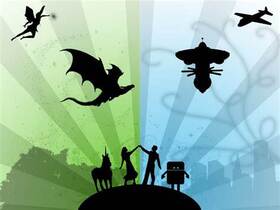 Science fiction and fantasy – are they really the same thing, but just with a bit of a twist? Let’s take a look at the differences – and the similarities. Both of them often feature worlds that don’t exist in reality, at least, not so far as we know. Both of them usually feature “magic”. In sci-fi they call this magic “technology”, but if it doesn’t actually exist then it might as well be magic. Both of them use strange creatures as part of the plot. In fantasy those creatures are elves, orcs etc and in sci-fi they’re alien beings or mutated viruses, but they are both the result of imagination, not reality. 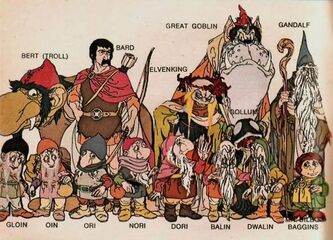 If you read our submission guidelines you will find that we don’t encourage authors to submit fantasy novels, but we’re happy enough with sci-fi. Given what we have said above, why would we not accept both – or neither? The author of this blog has read Lord Of The Rings (LOTR) three times and The Hobbit twice, so why does he have a downer on other works in the fantasy genre? It’s because so many authors of the fantasy genre write in clichés, or they are lazy. 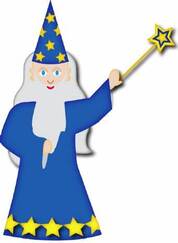 Let’s take the clichés first. Orcs, elves, wizards, dragons, magic rings or swords. Does any of that sound familiar? About the only thing that’s original in so many fantasy novels are the names that are given to the main characters and, I have to say, even those have a very familiar ring to them most of the time. So, what about that accusation of laziness? Most of it is to do with the way magic is used in the books. Is the hero stuck at the bottom of a deep pit? Magic him out of it. Is the hero just about to be barbequed by a dragon? Magic him out of there. In fact, any peril that the hero finds him/herself in is fixed by the use of magic. And if it isn't magic, it's other special powers such as being able to see events far away or see into the future. 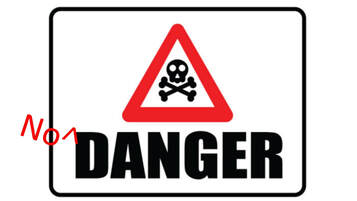 And that removes the drama. Once you know the author is going to save the hero’s life every time, using magic, there’s nothing to worry about. All tension is removed and the story becomes about as exciting as watching paint dry. The lazy author, therefore uses magic rather than trying to imagine some other way of allowing their hero to survive – or going back to re-write the plot in a way that no longer relies on magic to get the hero out of their fix. Ah, but LOTR uses magic. Gandalf’s a wizard and he uses magic a lot. And as for that ring – it’s total magic. Therefore, Selfishgenie Publishing, your argument is defeated. 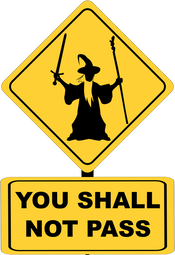 Yes, but think about how magic is used in LOTR. First of all, it is used very sparingly. If the problem can be solved using swords or guile, then swords or guile are used. Magic is always the weapon of last resort. But, more importantly, whenever magic is used, there is a price to pay. When Gandalf uses magic to fight the Balrog, it so exhausts him that he disappears from the book for a couple of hundred pages. When the ring is used to provide invisibility, not only does it place a great burden on the wearer, but it affects their personality. That is made very clear in The Hobbit, where we encounter its long-term user Gollum and at the start of LOTR with the way Bilbo reacts to having to give up the ring. 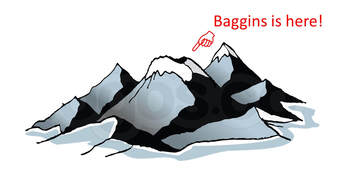 The ring also points a big fat finger at the wearer so that the Dark Lord can locate them. So, the ring and its powers have to be used sparingly. It is Frodo’s and Sam’s perseverance that gets them to Mount Doom in the end, not magic. It is about Frodo’s personal qualities, about why he was chosen for the task in the first place because, despite all temptations, he is the only one of the Fellowship of the Ring that can be trusted not to try to keep it for himself. Of course, there are fantasy writers out there who avoid both the clichés and the over-use of magic and rely on their characters to carry the plot, but we have to say that bitter experience has shown that they aren’t the authors who are submitting to Selfishgenie Publishing. You can try to prove us wrong, if you want, but excuse us while we roll our eyes. 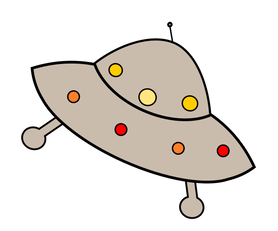 So, what of sci-fi, surely it is just as full of cliches, yet we publish that. Substitute magic for non-existent tech and you have the same sorts of problems. Of course we do, guilty on both counts. Which is why we have just as much of a problem with poor sci-fi as we do with poor fantasy. However, some of the sci-fi authors we publish have actually tried to base their “magic” on basic scientific principles.  Reputable scientists have theorised about the sort of technology that is used in their books and suggested that it might be possible to create that sort of technology sometime in the future. No less figures than Einstein, Steven Hawking, Erwin Schrodinger and others have speculated on what sort of advances in science might be made to allow the use of new technology in the future. Not only have they speculated, but serious research is now going on into some areas of science that were previously labelled “fictional”. OK, some of it may never produce any worthwhile results, but the research isn’t being done on a whim. There are some basic scientific principles underpinning it.  And, of course, after the last 18 months, when it comes to killer mutant viruses we need say no more. And if you can have mutant viruses, you can surely also have mutant people. Now, please don’t get us wrong. We think that fantasy is a legitimate genre for any author to write in. The best fantasy sits alongside the best works of all the other genres. But, unfortunately, the sorts of authors who submit fantasy to us seem to lack the imagination to come up with anything original. And it is originality that sells books. Now, having read this far you may now be saying "That's just your opinion", and you will be right. But if you had to read the amount of cliched fantasy that we receive, you might share our opinion. If you have enjoyed this blog and want to make sure you don't miss future editions, plase sign up for our newsletter by clicking the button below.
1 Comment
Chris Parrett
20/6/2021 07:23:16 pm
However, fantasy doesn't have to include magic. A writer can create a fantasy world or universe which obeys the universal laws of physics, and by good writing will justify any of the rules normally applying to biological matters … e.g. by explaining the plausible existence of creatures or beings who are, for example, pure energy or explaining how a race can 'shape shift' or be telepathic. The world the story is set in can be completely imaginary, 'fantastic' in the truest sense of the word, but nonetheless believable with good writing. It seems that fantasy itself isn't the issue… it's a matter of credibility and jeopardy.
Reply
Leave a Reply. |
AuthorThis blog is compiled and curated by the Selfishgenie publishing team. Archives
June 2025
|
 RSS Feed
RSS Feed